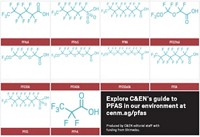Advertisement
Grab your lab coat. Let's get started
Welcome!
Welcome!
Create an account below to get 6 C&EN articles per month, receive newsletters and more - all free.
It seems this is your first time logging in online. Please enter the following information to continue.
As an ACS member you automatically get access to this site. All we need is few more details to create your reading experience.
Not you? Sign in with a different account.
Not you? Sign in with a different account.
ERROR 1
ERROR 1
ERROR 2
ERROR 2
ERROR 2
ERROR 2
ERROR 2
Password and Confirm password must match.
If you have an ACS member number, please enter it here so we can link this account to your membership. (optional)
ERROR 2
ACS values your privacy. By submitting your information, you are gaining access to C&EN and subscribing to our weekly newsletter. We use the information you provide to make your reading experience better, and we will never sell your data to third party members.
Persistent Pollutants
Chemical companies spar over PFAS pollution liability in US
DuPont, Chemours, and 3M just say no to broad cleanup responsibility
by Cheryl Hogue
September 11, 2019
| A version of this story appeared in
Volume 97, Issue 36

Executives from DuPont, Chemours, and 3M told Congressat a Sept. 10 hearing that their companies should not be held liable for widespread per- and polyfluoroalkyl substances (PFAS) pollution across the US.
DuPont spun off its fluorochemicals business into Chemours in 2015. As part of that move, DuPont believes that financial responsibility for decades of previous PFAS production also went to Chemours, said Daryl Roberts, DuPont’s chief operations and engineering officer. Chemours has adequate financial resources to foot the bill, Roberts said.
A Chemours executive said his company doesn’t have that money. Reiterating Chemours’s argument in a recently filed lawsuit, Paul Kirsch, the company’s president of fluoroproducts, said DuPont grossly underestimated the PFAS liabilities the spinoff inherited. Chemours wants DuPont to pony up money for cleanup.
And a vice president for 3M, which formerly manufactured two of the main PFAS tainting drinking water supplies across the US, said neither of those chemicals is causing adverse health effects in the general population. “The data simply don’t show any cause and effect relationships at historical levels of these materials in the environment,” said Denise R. Rutherford, 3M senior vice president of corporate affairs.
The two substances that 3M voluntarily took off the market about two decades ago are perfluorooctanoic acid (PFOA) and perfluorooctanesulfonic acid (PFOS). The US Environmental Protection Agency says both chemicals can cause reproductive, developmental, liver, kidney, and immunological effects in laboratory animals, and both led to tumors in animal studies. Epidemiology studies have found increased levels of cholesterol among people exposed to the substances. Toxicologists are investigating whether exposure to the chemicals reduces the body’s immune response (Crit. Rev. Toxicol., 2018, DOI: 10.1080/10408440802209804).
Meanwhile, hundreds of drinking water sources in the US are contaminated with PFAS. A number of states have regulated the amount of PFOS, PFOA, and, in some cases, other PFAS allowed in drinking water. The EPA is considering nationwide limits.
At the hearing, members of the House of Representatives’ Oversight and Reform Subcommittee on Environment tried to determine who will foot the bill for cleaning PFAS pollution.
Democratic lawmakers expressed frustration at the companies’ unwillingness to take responsibility for the pollution.
“This is ridiculous,” Rep. Dan Kildee (D-MI) said. “We have companies that have benefited and made millions and billions of dollars by selling these products into commerce who now want to point the finger at somebody else.”
As for 3M, “You want to get credit for the decision to no longer produce these dangerous chemicals voluntarily but in the same breath want us to believe that there’s no science that says that these chemicals are dangerous at all,” Kildee said to Rutherford. In Kildee’s district, Michigan has issued do not eat warnings for fish from the Huron River and deer from near a closed Air Force base because of high levels of PFOS.
DuPont’s Roberts and 3M’s Rutherford said PFOS and PFOA are no longer sold because they are biopersistent. The executives were otherwise silent on the issue of toxicity.
Two lawyers who led successful litigation against 3M and the original incarnation of DuPont told lawmakers that both companies were aware for years that PFOS and PFOA were hazardous to health.
“Public records and public trial exhibits in the lawsuit show that 3M knew but concealed the dangers of these chemicals for decades,” said Lori Swanson, former attorney general of Minnesota. Swanson filed suit against 3M in 2010 seeking cleanup of PFAS from the company’s operations in the state. 3M settled the suit last year.
Rep. Katie Hill (D-CA) pressed the chemical company executives about PFAS liability. “Who is going to pay for the injuries and the cleanup—these companies or the taxpayers?” she asked, noting that Chemours did not exist when much of the current PFAS contamination occurred.
“We don’t believe the taxpayers should pay,” DuPont’s Roberts responded, adding that his company is cleaning up PFAS at three facilities it still owns.
“What these companies have done is deeply immoral and shameful,” said subcommittee chair Harley Rouda (D-CA), who has convened three hearings on PFAS pollution this year.




Join the conversation
Contact the reporter
Submit a Letter to the Editor for publication
Engage with us on Twitter